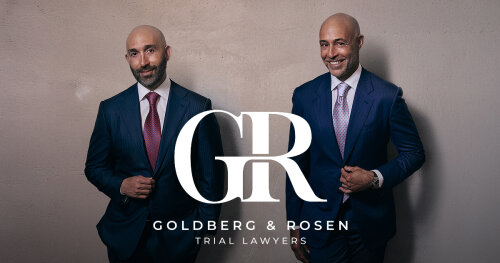Best Consumer Rights Lawyers in Florida
Share your needs with us, get contacted by law firms.
Free. Takes 2 min.
Or refine your search by selecting a city:
List of the best lawyers in Florida, United States
United States Consumer Rights Legal Questions answered by Lawyers
Browse our 1 legal question about Consumer Rights in United States and read the lawyer answers, or ask your own questions for free.
- Do i have recourse for issues that stem from medical tourism that kept my records
- I went to mexacali to hopefully get a back issues taken care of. I'm not saying I didn't get the shots but the medical folder had receipts orders from dr and images missing. Without the order for el chopo I can't get the rest of the dexa.pictures. also my driver... Read more →
-
Lawyer answer by mohammad mehdi ghanbari
Hello,I read about the distressing experience you had with your medical treatment in Mexicali. I am so sorry to hear about what you went through. It is completely unacceptable to be left with so many unanswered questions and missing items,...
Read full answer
About Consumer Rights Law in Florida, United States
Consumer Rights Law in Florida is designed to protect individuals who purchase goods or services for personal, family, or household use. These laws provide a framework for fair trade, protect consumers against unfair or deceptive practices, and help ensure that businesses operate transparently and honestly. Florida has specific statutes that address issues like debt collection, warranties, and false advertising in addition to federal consumer protection laws.
Why You May Need a Lawyer
If you encounter problems as a consumer in Florida, a lawyer can help safeguard your interests and ensure your rights are protected. Common situations that may require legal assistance include:
- Being harassed or threatened by debt collectors
- Victimization through false advertising or deceptive sales tactics
- Problems with defective products or breach of warranty
- Disputes over contracts or service agreements
- Credit reporting errors and identity theft issues
- Unlawful repossession of vehicles or property
- Issues involving unfair terms in leases or rental agreements
A consumer rights lawyer can assess your case, explain your legal options, represent you in negotiations, and take your case to court if necessary.
Local Laws Overview
Several key laws and statutes in Florida are especially relevant to consumer rights:
- Florida Deceptive and Unfair Trade Practices Act (FDUTPA): This law prohibits businesses from engaging in deceptive, unfair, or unconscionable acts. It allows consumers to seek damages if they are harmed by such practices.
- Florida Lemon Law: Protects consumers who purchase or lease new vehicles that turn out to be defective. The law requires the manufacturer to repair, replace, or refund a defective vehicle under certain conditions.
- Debt Collection Laws: Both the federal Fair Debt Collection Practices Act and Florida’s Consumer Collection Practices Act restrict how collectors can interact with consumers. Illegal harassment, false statements, and certain types of threats are prohibited.
- Warranties: Both express and implied warranties are recognized. Florida law outlines what constitutes a breach of warranty and your legal recourse.
- Truth in Lending and Advertising Laws: Require businesses to clearly disclose the terms of loans, credit sales, and advertisements, including any fees or interest rates associated with financial transactions.
These laws work together to ensure transparency in the marketplace and offer mechanisms for consumers to address violations of their rights.
Frequently Asked Questions
What should I do if I have been sold a defective product?
You should first contact the seller and manufacturer to report the issue and request a repair, replacement, or refund. If the problem is not resolved, review any warranty terms and consider seeking help from a consumer protection agency or a lawyer.
How does the Florida Lemon Law work?
The Florida Lemon Law applies to new vehicles that have defects affecting their use, value, or safety. If the defect cannot be fixed after a reasonable number of attempts, you may be entitled to a replacement or a refund.
Are there laws to protect me from debt collector harassment?
Yes. Both federal and Florida laws regulate debt collection practices. Collectors cannot use harassment, make false statements, or threaten you with actions they cannot legally take. If you believe you are being harassed, keep records and consider talking to a lawyer.
What is considered false advertising in Florida?
False advertising includes any misleading statements about a product or service that can deceive consumers. Businesses must be truthful in their marketing and provide accurate information about prices, features, and any conditions.
Can I cancel a contract or purchase after signing?
Florida law gives certain cancellation rights, such as the three-day cooling-off period for door-to-door sales. However, not all purchases qualify for cancellation. Review any agreement carefully and consult a lawyer if you are unsure.
What are my rights if my landlord is not maintaining the rental property?
Florida law requires landlords to maintain the property in a safe and habitable condition. You should notify the landlord in writing of any issues and give them time to make repairs. If they do not respond, you may have further legal options.
What is an implied warranty?
An implied warranty is a legal guarantee that a product will work as expected, even if it is not explicitly stated in writing. For example, most goods sold have an implied warranty of merchantability, meaning they should be fit for ordinary use.
How do I dispute an error on my credit report?
Request a copy of your report from the major credit bureaus, identify any mistakes, and file a dispute with the credit bureau in writing. They are required to investigate and correct any inaccuracies.
What should I do if I am a victim of identity theft?
Contact your bank, credit card companies, and credit bureaus immediately. File a police report and keep copies for your records. You may also consider placing a fraud alert or credit freeze on your accounts and consulting a lawyer.
Who enforces consumer protection laws in Florida?
The Florida Attorney General's Office, local consumer protection agencies, and the Federal Trade Commission (FTC) are responsible for enforcing consumer protection laws and responding to complaints.
Additional Resources
If you need assistance or more information on consumer rights in Florida, consider reaching out to the following organizations:
- Florida Attorney General’s Consumer Protection Division
- Florida Department of Agriculture and Consumer Services
- Federal Trade Commission (FTC)
- Consumer Financial Protection Bureau (CFPB)
- Local Legal Aid Societies and Bar Associations
- Small Claims Court for resolving minor disputes without formal legal representation
Next Steps
If you believe your consumer rights have been violated in Florida, take the following steps:
- Document everything - keep receipts, communications, and any evidence of unfair treatment
- Try to resolve the issue directly with the business or service provider
- Contact a relevant governmental agency to file a complaint
- If you do not achieve a satisfactory resolution, consult a consumer rights lawyer who can review your case and discuss your legal options
- If needed, consider filing a claim in court, often starting with small claims court for lower-value disputes
Legal advice can help protect your interests and ensure that your rights as a consumer are upheld. Do not hesitate to seek professional help if you are unsure how to proceed.
Lawzana helps you find the best lawyers and law firms in Florida through a curated and pre-screened list of qualified legal professionals. Our platform offers rankings and detailed profiles of attorneys and law firms, allowing you to compare based on practice areas, including Consumer Rights, experience, and client feedback.
Each profile includes a description of the firm's areas of practice, client reviews, team members and partners, year of establishment, spoken languages, office locations, contact information, social media presence, and any published articles or resources. Most firms on our platform speak English and are experienced in both local and international legal matters.
Get a quote from top-rated law firms in Florida, United States — quickly, securely, and without unnecessary hassle.
Disclaimer:
The information provided on this page is for general informational purposes only and does not constitute legal advice. While we strive to ensure the accuracy and relevance of the content, legal information may change over time, and interpretations of the law can vary. You should always consult with a qualified legal professional for advice specific to your situation.
We disclaim all liability for actions taken or not taken based on the content of this page. If you believe any information is incorrect or outdated, please contact us, and we will review and update it where appropriate.
Browse consumer rights law firms by service in Florida, United States
Florida, United States Attorneys in related practice areas.
Browse consumer rights law firms by city in Florida
Refine your search by selecting a city.












